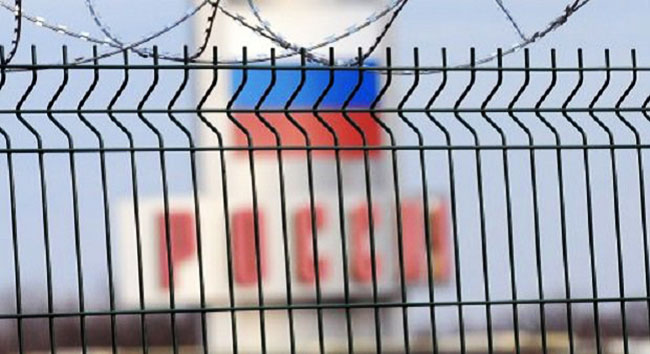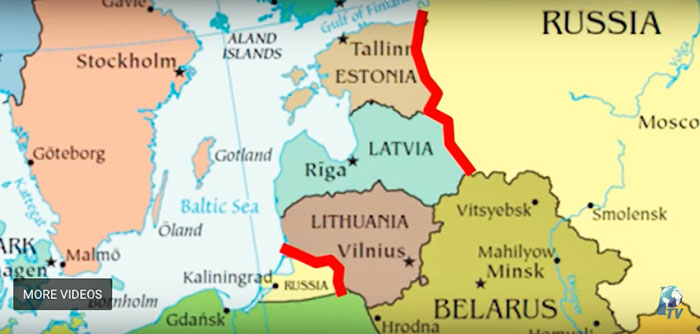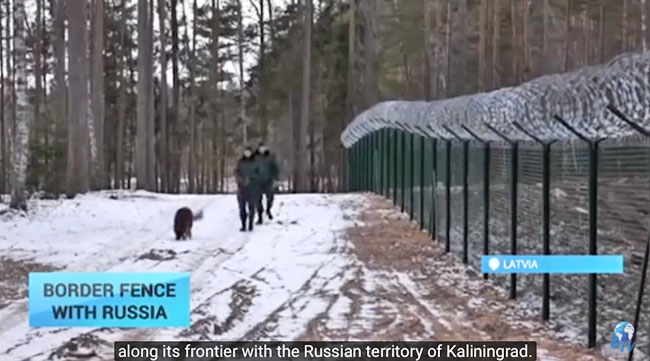|

by Manlio Dinucci
September 18, 2018
from
IlManifesto Website
translation by
Pete Kimberley
September 22, 2018
from
GlobalResearch Website
Original
Italian version
Spanish
version

Latvia is presently building a metal fence, 90 kilometers long and
2.5 meters high, along its frontier with Russia.
It will be finished
before the end of the year, and will be extended in 2019 along more
than 190 kilometers of the frontier, for a planned cost of 17
million Euros.
A similar 135 kilometer fence is being built by Lithuania along its
frontier with the Russian territory of Kaliningrad.
Estonia has announced the impending construction of a wall, also
along the frontier with Russia, 110 kilometers long and also 2.5
meters high. Planned cost - more than 70 million Euros, for which
the Estonian government intends to ask for finance from the European
Union.
The objective of these walls, according to government declarations,
is to,
"protect the exterior frontiers of Europe and NATO".
If we leave aside for a
moment the idea that they need to be "protected" from massive
migratory flows from Russia, there is only one motive left:
the
exterior frontiers of the EU and NATO now need to be "protected"
from the "Russian menace".

Since the fences built by
the Baltic countries along their frontiers with Russia have a
military efficiency approaching zero, their objective must be
fundamentally ideological - a physical symbol that just beyond the
fence, there lurks a dangerous enemy who is threatening us.

In this context, the President of the Italian Republic, Sergio
Mattarella, visited Latvia twice - the first time in July on the
occasion of his tour of the Baltic countries and Georgia.
Then, at the official
dinner in Riga, he congratulated Latvia for having chosen,
"integration with
NATO and the European Union" and for having decided to "adopt
the model of an open society, founded on the respect of the rule
of Law, democracy, and the central place of human rights".
Source: PandoraTV
(IT/EN/PT/FR/SP/DE/RU/NO)
He addressed this comment to Latvian President Raymond Vējonis,
who, in April, had already approved the project for a law forbidding
the teaching of Russian in Latvia, a country whose population is
composed of almost 30 % of ethnic Russians, and where Russian is the
main language of 40% of its citizens.
A liberticide measure
which, by forbidding multilingualism - which is recognized by the
European Union itself - will later discriminate against the Russian
minority, accused of being "Russia's fifth column".
Two months later, in September, President Mattarella returned to
Latvia to take part in an informal summit of the heads of state of
the European Union, where, amongst other subjects, they dealt with
the theme of cyber-attacks by "states which have a hostile attitude"
(a clear reference to Russia).
After the summit, the President of the Republic visited the military
base of Ᾱdai, where he met with the Italian contingent included in
the NATO battle group deployed in Latvia as part of the "advanced
forward presence" at the frontiers with Russia.
"Your presence is an
element which reassures our friends from Latvia and the other
Baltic states", he declared,
...words which
substantially bolster the psyop by suggesting that there exists a
threat from Russia to the Baltic nations and the rest of Europe.
On 24 September, Pope
Francis will also be arriving
in Latvia on a visit to the three Baltic countries.
We don't yet know if, by
repeating,
"we must build
bridges, not walls",
...he will have something
to say about the new iron curtain which divides the European region
and is preparing people's minds for war.
Or whether in Riga,
laying flowers on the "Monument to Freedom", he will demand the
freedom for young Russian Latvians to learn and use their own
language.
|




